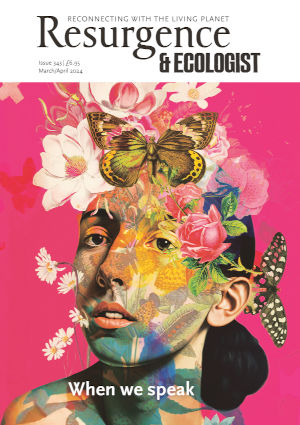As Barbara Gardner, founder of the Animal Interfaith Alliance, has so often pointed out, nearly all religions have something good to say about non-human animals (such as the Golden Rule), but too often they have ignored their own words. Yet literally billions of humans claim to be religious. The animals could do with having them on their side. Joyce D’Silva’s concise and learned book is a major step in the right direction.
Animal Welfare in World Religion consists of five chapters, each dealing with one religion – Judaism, Christianity, Islam, Hinduism and Buddhism – and one final chapter entitled ‘Beyond the Major Religions’, in which D’Silva gives attention to various other ways of viewing the human–animal relationship: those of Sikhs, Jains, First Nations Peoples in Australia, Rastafarians, and some Indigenous societies. Each of the six chapters has over 100 references, but this excellent book remains slim and readable.
In the last 200 years humans have filled the world with polluting artefacts – with concrete and metal and toxic chemicals. But around 2,000 years ago, at a time when most great religions had been formulated, the things that commanded most attention in addition to human affairs were indeed the other animals – and they were often feared or adored, painted on cave walls, worshipped or hunted.
In Ancient Egypt we can glimpse a society that loved animals and yet mercilessly exploited some of them, and a pantheon of gods that had animal forms and even alleged powers over the human afterlife. Animals were part of human religion, figures of respect and fear as well as of protection. Religions are often about explaining the universe, providing a purpose and a hoped-for power to cure illnesses, predict the future and defeat one’s enemies. They also provide a central morality about what is right and wrong – and often provide the hope of a life after death.
During the first 1,300 years of Christianity, animals became increasingly important, and stories about early saints were full of tales of animals being rescued from hunters, fed, cared for and lived with. A love of animals became almost a hallmark of sainthood.
But gradually the animals were demoted and squeezed out of human lives and human religions. They no longer played a central religious role as totems or divinities. One species, the human, proliferated and replaced other animals with machines and guns and computers. I have found that wars tend to distract us all, historically speaking, from our concerns for non-human sentients. From 1914 (first world war) through 1939 onwards (second world war), non-humans have had a terrible time with human encroachment, factory farming, bloodsports, vivisection, industrial exploitation and a deteriorating environment. (We see it happening again now, with good animal legislation being shelved at a time when we have two more wars to worry about.)
However, I hope the pendulum is now beginning to swing back to a more neighbourly and kinship relationship with the other animals – at last a post-Darwinian rejection of speciesism, and a realisation of the moral importance of the capacity to suffer. Since Darwin, we should accept that we too are an animal species, and that the other animals can, like us, suffer pain.
Like me, D’Silva has been active as a campaigner trying to rescue our evolutionary relations from suffering. Pain has involved us more than a pure concern for conservation (which can be a bit anthropocentric sometimes).
D’Silva’s superb campaigning against factory farming has been unsurpassed. In her conclusions to this book, she reminds us that humans slaughter over 80 billion land-based animals a year for food, and a trillion wild-caught fish, and use over 100 million animals for research purposes. Yet preachers and priests for the most part ignore this. They are ignoring the views of millions of people.
I agree with D’Silva that this is a fundamental failure of the world’s faiths, many of which had founders who really did care about the other animals. Religions have, however, nearly always developed into speciesist organisations. What a speciesist species we are.
Animal Welfare in World Religion: Teaching and Practice by Joyce D’Silva. Routledge, 2023. ISBN: 9781032273990.







